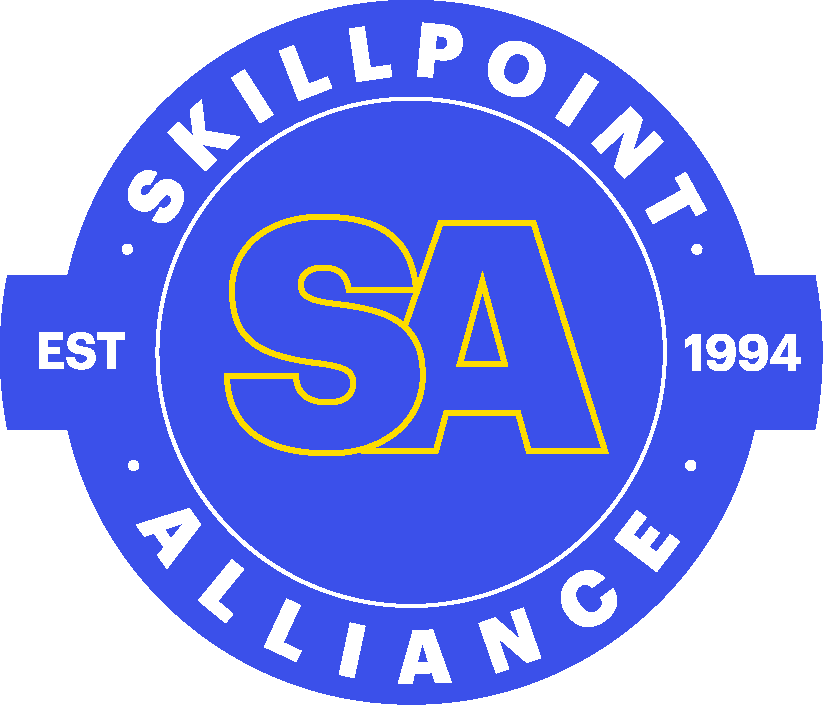This post is part of an ongoing series, Meet Skillpoint, where you will hear from the people behind our work to build human capital in Central Texas.
Skillpoint is pleased to introduce Brian Haulotte as one of the newest members of Skillpoint’s Board of Directors. Brian attended middle and high school in Austin after relocating from Ann Arbor Michigan, and began his construction career by working as a laborer and carpenter during his high school and college breaks. After graduating from Texas A&M University with a B.S. in Construction Science, Brian began his professional career as an Estimator in Dallas. Since then he has worked as a Field Engineer, Project Manager, and Preconstruction Manager. Today, Brian is a LEED AP, Vice President, and Senior Preconstruction Services Manager for JE Dunn Construction.
Brian serves in the Austin community as an Elder of Hope Presbyterian Church in Austin, and with Austin Partners in Education (APIE) as an 8th Grade Math Classroom Coach at Martin Middle School.
At Skillpoint, we partner with industry professionals to ensure that our workforce development programs are meeting employers’ needs for a qualified workforce, as well as leading to college and career success for Texans. Skillpoint was founded on our Gateway construction program, and we’re thrilled to add Brian’s industry experience and knowledge to our board.
Recently, we asked Brian for his thoughts on Skillpoint and the economic state of Austin. Read more below:
What piqued your interest about Skillpoint?
Two of my passions are education and the construction industry where I’ve spent my entire career. At first, I saw Skillpoint Alliance’s mission of youth education and skilled workforce development as a meaningful way in which I could serve my community. But once I understood the significant impact that Skillpoint makes – by engaging students in fun activities that open their possibilities to STEM based careers as well as training adults to both enter the workforce and to improve their successes – I realized that this was an organization that excited and challenged me to become involved.
In 2015, Austin was ranked the #2 fastest growing city in the U.S. We’re also ranked the #1 economically segregated city in the nation. For you personally, what are the most important issues we – as a community – need to focus on to close the gap in our city?
The popular saying that “a rising tide lifts all boats” has for years been a simple way to illustrate that a strong economy will benefit everyone. Unfortunately, the reality is that our strong and fast-growing Austin economy has not benefited everyone within our community. We are faced with reconciling Austin’s economic prosperity with the fact that there are many of us struggling with the reality of political, educational, and financial segregation and the effect that has on mobility and access to opportunities.
But, as harsh as this economic segregation is today, the greater concern should be about the ripple effect that this will have on the futures of children growing up with limited or no opportunity to climb the economic ladder. So, we must look to ideas and initiatives that both break the cycle of economic segregation as well as redirect the trajectories of those living outside of prosperity toward brighter futures. I see the investment in education as not just a great equalizer within our society but as the foundation required to open the doors to opportunities that would not be available otherwise. So, while a robust economy can benefit many, it’s everyone’s responsibility to make sure that our neighbors receive the education, learn the skills, and can practice their knowledge to build their “boat” so that strong economy can lift them as well.
How have you seen increased opportunity to STEM education and/or workforce development positively affect people’s lives?
I’ve noticed a positive shift in both the approach to teaching STEM subjects as well as the community’s attitude about the significance that these subjects play in every student’s education. I’ve seen experiential learning used to teach science and math, giving students a greater understanding when they are learning and practicing in a way that simulates real world situations and problems. When students are engaged and encouraged to be curious about how and why things work and also given the chance to seek out new ideas, students are eager to rise to the challenge. Also, when adults show a genuine interest in student success (as mentors, volunteers, and coaches), education becomes a community effort where we’re all invested in achievement and opportunity.
If you’d like to connect with Brian, you can find him on Twitter or LinkedIn.

